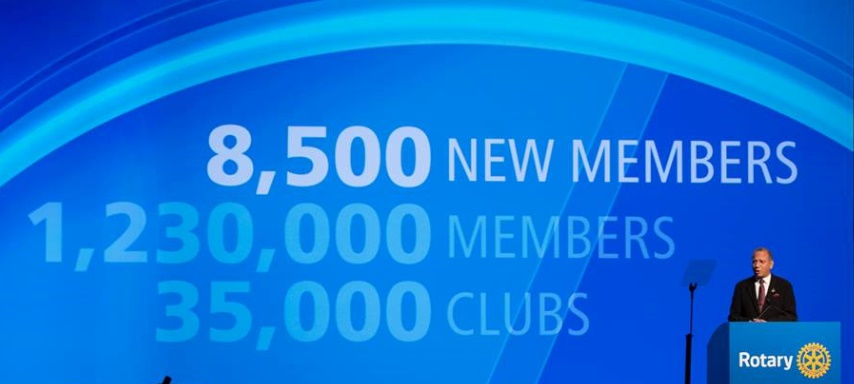On 1 July, the baton will be passed, in every Rotary district, from my class of district governors to yours. And I in turn will also pass the baton of leadership — the one that has been handed down from Paul Harris, through the generations, to me — on to President-Elect John Germ.
I will happily tell all of you that our president-elect is not only one of the nicest people you will ever meet, but certainly smarter than I am.
John is an Air Force navigator, a civil engineer, and such an expert on polio that when you go with him to these big meetings, at the World Health Organization and so on, you find that as soon as he starts talking, people start addressing him as “Doctor.”
So it is with absolute confidence in his abilities, and in yours, that I look forward with you to Rotary’s future: a future in which you will build on nearly 111 years of Rotary service, to meet the growing and changing challenges of a growing and changing world. A world in which Rotary’s greatness will be measured not only by its muscle, but also by its might; not simply by its size, but also by its strength; not merely by the numbers of its members, but by the ability and the willingness of those members to do what needs to be done — and do it well.
Rotary is growing. We have 1.23 million members, in more clubs than ever before. New members continue to join, and choose to stay; our numbers have grown by over 8,500 new members just since July first.
We are in a position of tremendous strength in Rotary: in our achievements, in our Foundation, and in the respect that our organization has earned.
But we know that in order to move forward, we have to be doing more to build Rotary’s greatest asset of all: our membership. By building clubs that are not only large, but diverse; not only skilled, but motivated; with not only the drive but the ability to succeed.
At Rotary headquarters, we are working hard to find new and innovative ways to add more value to Rotary membership, such as our Rotary Global Rewards. In just over half a year, we’ve had over 44,000 visits to the site, from well over 12,000 users: more than half of them have redeemed one of the over 700 offers that are now available, saving money and strengthening the Rotary network. It’s still largely U.S.-centric but expanding and growing each day to other parts of the world.
We’ve become more flexible than ever in our clubs, finding new ways to make Rotary membership a practical and appealing option to people at all stages of their lives, families, and careers.
And we’ve made it a priority to support the development of clubs that are better able, in every way, to serve their communities with the work that only Rotarians can do.
I have seen so much of that work in this year.
In India, Rotary is equipping 40,000 schools with toilet blocks — each with two toilets for boys and two for girls.
In South America, Rotary is building schools and bringing literacy to youth.
Here in the U.S., I have seen Rotary present a helicopter to a children’s hospital, enabling rapid responses to critical emergencies.
And I have seen the most beautiful park specially tailored to suit children with disabilities, built by Rotary. A park with specially designed swings, and merry-go-rounds even for wheelchairs, and other such amenities.
In Italy, Rotarians are working with the Vatican on mobile medical units and telemedicine for Cambodia. And such is the respect that the Vatican now has for Rotary that His Holiness Pope Francis has announced that on 30 April 2016 he will give Mass to Rotarians at St. Peter’s Square. This is an unprecedented event and a tremendous honor that will raise Rotary’s status across so much of the world. We have 8,000 seats reserved, and I hope I will see many of you there.
In Afghanistan and Pakistan, Rotary is working with health authorities and government at the highest levels, ensuring that the world’s last reservoirs of wild poliovirus continue to shrink and that polio will be eradicated, soon and forever.
When you hear these stories of Rotary, when your hearts are filled with wonder at the work that Rotary is doing, and with awe at the thought of what we could be doing, I ask you to remember that it does not begin with you or with me. It begins with our members, working in their communities, meeting in their clubs, enjoying their service, coming together through Rotary, because they know that Rotary is their best path to a life well lived.
And your job is not to do that service, but to support it. To end your year with a district that is better than it was when your year began, with Rotarians who have the same sense of purpose, of dedication, and of ambition as all of us have here tonight.
But there is one thing that we have in this room tonight that we do not have in most of our Rotary clubs. That we have never had. And that we must work to achieve, throughout our entire organization. That is women and men in equal numbers.
In 1995, only five of every 100 Rotarians were women. Today, that number has risen to 20. It is progress, but it is not enough.
Because in order to fully represent our communities, we must truly reflect our communities. And it is just common sense to say that if we want all of our communities to reach their full potential, economically, socially, and educationally, we can’t exclude half of the world’s population from being fully represented in Rotary. We have had women in Rotary for only the last quarter of our history, and it is no coincidence that those years have been by far our most productive.
Rotary’s policy on gender equality is absolutely clear. Yet nearly one-fifth of our clubs today continue to exclude women, usually by claiming that they simply cannot find women who are qualified for membership.
I would say that any Rotarian who makes this argument, or believes it, lacks the two most basic qualifications for Rotary membership: honesty and good sense. Let me tell those, who choose to live in a Jurassic Park era, that they should take a moment to remember what happened to the dinosaurs. They became extinct!
Equality for women is not just a nice extra. It is absolutely essential to our service, to our future. If we don’t put it front and center, we are dead in the water before we even begin.
A club that shuts out women shuts out much more than half the talent, half the ability, and half the connections it should have. It closes out the perspectives that are essential to serving families and communities effectively. It damages not only its own service, but our entire organization, by reinforcing the stereotypes that limit us the most. It makes our partners take us less seriously. And it makes all of Rotary less attractive to potential members, especially the younger people who are so crucial to our future.
To tolerate discrimination against women is to doom our entire organization to irrelevance.
We cannot pretend that we still live in Paul Harris’ time, nor would he ever want us to. For, as he said, “The story of Rotary will have to be written again and again.”
In the new Rotary year that lies before you — you are the ones who will write that story.
And it is an awesome responsibility you carry — one on which lives, and livelihoods, very literally depend.
In the year to come, you will find yourselves stretched, pushed, tested, perhaps more than you ever have been before. You will be challenged, again and again — but I know you will rise magnificently to those challenges. For you will find that it is often the weight of responsibility that unleashes the abilities within us.
So I want to finish tonight by reminding you of the lessons of the Greek mathematician Archimedes.
In his own time, he was famous for his work in physics and geometry. He calculated the area of a circle and the volume of a sphere. He was already an old man when the Romans came to attack his island home of Syracuse. And it was Archimedes who rose to the hour, who drew upon his abilities in entirely new ways, designing and devising new means of defense with the simplest of tools: a stick and a sandbox.
He had the defenders of the island array polished mirrors on the coast, so that the reflected rays of the sun converged on approaching ships. Hundreds of years later, the Greeks spoke in awe of the rays of Archimedes, which caused the Roman ships to burst into flames. Today, Archimedes is remembered by the Greeks not only as a mathematician, but as a hero.
Little is known today about the life of Archimedes. Few of his writings survive. But tradition has it that when he demonstrated the use of the lever, he said, “Give me a lever that is long enough, and a fulcrum on which to place it, and I can move the world.”
My friends, we have the fulcrum. The fulcrum is Rotary. And Rotarians are the lever.
Together, we can move the world. And we will.
Thank you.
Source: Rotary International


 RSS Feed
RSS Feed




